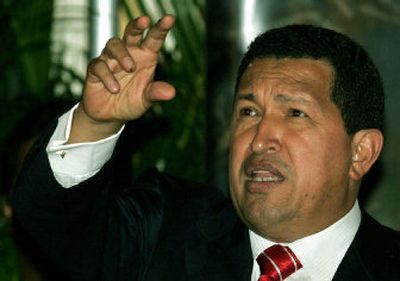Chavez pushing ‘new socialism’

CARACAS, Venezuela – The shopping mall is a blur of Guess jeans, Louis Vuitton purses and Motorola cell phones, a temple of consumerism in a country that is supposed to be on a path toward socialism.
So popular is the Sambil Mall that “Sambil society” has become a derogatory term in the Venezuelan socialist vocabulary. Reject it and build a fairer Venezuela, President Hugo Chavez urges his nation of 25 million people.
But for many, it’s a hard sell.
“We’re capitalists, consumers by nature,” said 26-year-old Marbelys Gonzalez, strolling through the mall, with friends, carrying a shopping bag filled with five pairs of designer jeans. “We’re crazy about shopping. If we go out and don’t end up buying anything, we don’t feel good.”
Gonzalez isn’t a member of the Venezuelan elite often derided by Chavez, but rather a middle-class university student whose spending money comes from her father, a jeweler, and her boyfriend, a soldier.
While most Venezuelans are too poor to afford luxuries, they live amid conspicuous consumption – cosmetic surgery, SUVs, highways lined with billboards advertising Swiss watches and Scotch whiskey.
Chavez may voice admiration for Fidel Castro’s Cuba, but Caracas bears little resemblance to Havana.
Ritzy social clubs, walled-in mansions and private schools are the norm for the wealthy, while the poor live in vast slums where unemployment runs high and gunfights are common. But even among the poor, the consumerist urge is evident in the Nike sneakers on many feet and the satellite TV antennas on cinderblock homes.
Chavez says capitalism created Venezuela’s poverty, and a “new socialism of the 21st century” can end it.
“It’s the search for social justice, for equality,” Chavez said recently. “The capitalist model is perverse. It favors a minority and expropriates from the majority.”
It remains unclear what sort of socialism Chavez may achieve, but his latest moves provide hints – raising taxes on foreign companies pumping oil, setting up stores to sell cheap food to the needy, subsidizing farming and industrial cooperatives, and handing over some wealthy ranchers’ lands to poor farmers.
“Every day it looks more like the communism of Fidel Castro,” says Jesus Garrido Perez, an opposition congressman
Moving toward Chavez’s vision of socialism will require great changes in the way most Venezuelans think, said Luis Damiani, a sociology professor who sympathizes with Chavez’s goals. “It’s a problem of values,” Damiani said. “The entire society is immersed in the values of consumerism.”